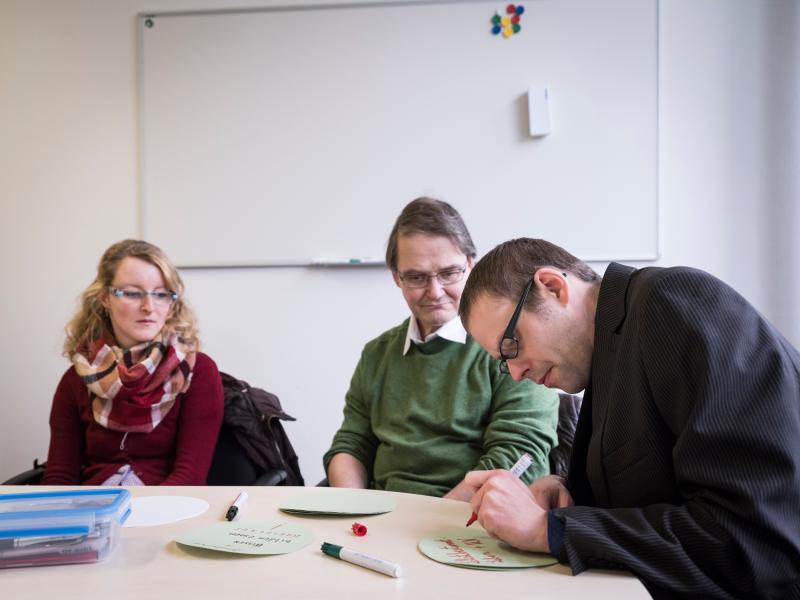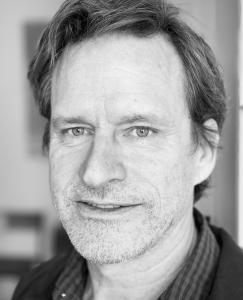German institute offers society disabilities education that shows disabled people how to help communities become more inclusive
Samuel Wunsch is an evangelist for breaking down the barriers between disabled and non-disabled people. The way he sees it, he’s answering his true calling.
“I want to help people without disabilities to remove the barriers in their own minds,” he says. “I want them to notice the competencies of people with disabilities. But I also want the students to learn that nothing in life should be taken for granted.”
Samuel, who has some intellectual, learning, and physical disabilities, is an educational specialist at the University of Kiel, a port city in northern Germany. His role is to teach students about the lives of disabled people and to take part in campus life for the benefit of students, professors, and staff.
His presence is thanks to the Institute for Inclusive Education, whose mission is to mend the societal divide between people with disabilities and people without them. “There’s still systematic segregation here in Germany that is quite a big problem in our society,” says Annika Hase of the Institute for Inclusive Education.
The programme was created in 2013 and is the brainchild of Jan Wulf-Schnabel, a German entrepreneur and former professor in social management. Jan “wanted to bridge the massive divide between the segregated worlds of people with so-called intellectual disabilities on one side and the elitism of the higher education sector on the other side,” says Annika, who organizes the certificate programme in new locations.
Helping society become inclusive
The programme consists of three years of training for the educational specialists, who begin giving presentations to students during their training. “They give lectures and seminars to the students at the universities, talking about their lives and needs as people with disabilities and reflecting together with the students about how society has to change to become more inclusive,” Annika says. After they are certified as educational specialists, they are placed in jobs, either with the university where they trained or through the institute.
More typically in Germany, people with intellectual disabilities go from special schools to work in segregated workshops for people with disabilities, doing mainly manual or factory labour.
There are about 320,000 people in Germany with disabilities working in 734 specially designated workshops, Annika says. “But we also have 3 million students at 530 universities, and we want to bring these two groups together,” she says. “We want students to learn to lose their fear of contact but also to recognise people with disabilities with their own competencies. We want them to see that these people have so much to bring to the table.”
For Samuel, the opportunity to leave the segregated workshop where he had worked for years changed his life. “I can say that my work in the workshop was at the beginning very nice,” he says. “But with time it became very monotone. And I needed a new challenge.”
In 2013, Samuel saw an advertisement for the inclusive education project and applied. “From that time on I’ve been proving this is what I really want to do, and I’ve found my personal calling,” he says.

Samuel Wunsch on the far right and two of his students
Samuel learned to work in a team, how to deal with his emotions and handle conflicts. “I have a better understanding now of the different lives and needs of people with disabilities,” he says. “Today I get to be very creative and live a self-determined life. Another big change is that I am now employed at the Kiel University.”
Reaching thousands of students
The Institute for Inclusive Education is mainly funded by grants. It also earns income through the expansion of the certification programme to new locations. The institute supports and counsels other project teams throughout Germany in implementing certification programs at universities. So far, there are six additional locations in Germany where educational specialists are trained. By 2023, the institute will have 60 active educational specialists reaching more than 50,000 students each year, creating a ripple effect of awareness that those students can then carry forward, Annika says.
Eventually, the institute would like to expand internationally. It has had interest from universities in Ireland, England, and Austria among other places.
The institute won the second-place prize and €30,000 in the 2021 Social Innovation Tournament. The contest was created by the EIB Institute to support entrepreneurs who are helping the environment and society. The Institute for Inclusive Education has won several other awards. In 2016, Jan Wulf-Schnabel won an Ashoka Fellowship. This award honors entrepreneurs who are helping society.
Annika says the educational specialists are making a difference on campus.
“We hear from a lot of students that during our seminars it’s the first time they have come into contact with people with disabilities,” she says. “So for everyone in this world it’s important to have an understanding of how do I interact with people with disabilities, what is needed from me in this situation.”
Samuel explains that the work is helping many people see disabilities in a different light.
“Last week for example we gave a lecture to more than 200 students, and they got so impressed and thankful,” he says. “They told us that we really changed their minds, and now they see things from a different perspective.”
